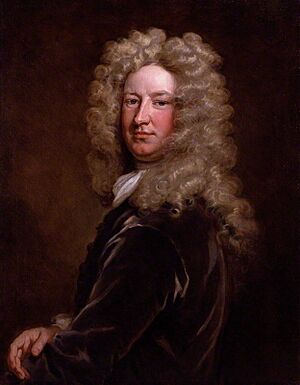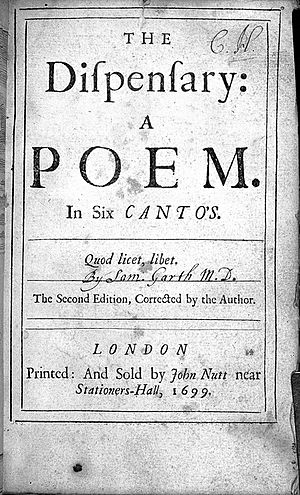Samuel Garth facts for kids
Sir Samuel Garth (born in 1661 – died on January 18, 1719) was an English doctor and a poet. He was a very important person in London during his time. He was known for his medical work and his clever poems. He even became a doctor to the King!
Contents
Life of Sir Samuel Garth
Samuel Garth was born in a place called Bolam in County Durham, England. He went to Peterhouse, Cambridge University in 1676. He earned his first degree in 1679 and a master's degree in 1684. In 1691, he became a doctor and joined the Royal College of Physicians.
He moved to London and quickly became a very busy doctor. Samuel Garth was a strong supporter of the Whig political party. He was good friends with famous writers like Joseph Addison and Alexander Pope. Even though Pope had different political ideas, they remained friends. In 1714, King George I made him his personal doctor and gave him the title of "Sir."
Science in Court: The Sarah Stout Case
In 1699, Sir Samuel Garth was asked to share his medical knowledge in a court case. This case involved a woman named Sarah Stout. Some people believed she had been put into the water after she died. The main reason for this idea was that her body was floating when it was found.
Doctors like Samuel Garth and Hans Sloane gave their opinions in court. They explained what they knew about bodies in water. In the end, the people accused were found not guilty. This case is interesting because it was one of the first times that "expert testimony" was used in a trial. It showed how science, like forensic science, could help courts understand what happened.
Garth's Personality
Sir Samuel Garth was known for being very direct and sometimes sharp with his words. For example, in 1714, when he heard that a lawyer named Sir John St Leger was made a judge in Ireland, he famously said, "God help the country where St Leger is made a judge!" This shows he wasn't afraid to speak his mind.
He once owned a large estate called the manor of Edgcott in Buckinghamshire. Sir Samuel Garth passed away on January 18, 1719.
Works and Poems
In 1697, Sir Samuel Garth gave an important speech called the Harveian Oration. In this speech, he talked about a plan to help poor people who were sick. He wanted to create special clinics, called dispensaries, where they could get medical care. This was to protect them from doctors and pharmacists who charged too much money.
The Dispensary: A Humorous Poem
In 1699, he published a long poem called The Dispensary. This poem was a "mock-heroic" work, which means it made fun of serious epic poems by using a silly topic. It was an instant hit and was printed three times in just one year! In the poem, he made fun of the pharmacists and some doctors who worked with them.
Garth's poem is a funny take on traditional epic stories. It's a great example of a type of writing called "medical poetry."
Other Writings and Contributions
Sir Samuel Garth also wrote a descriptive poem called Claremont. He helped translate a book about the life of a Roman emperor named Otho. He also edited a translation of Ovid's Metamorphoses, a famous collection of myths. Other famous writers, like Addison and Pope, also helped with this translation.
Garth played an important role in making sure the famous poet John Dryden received an honorable burial. He even gave a speech at Dryden's funeral in Westminster Abbey.
In 1704, he wrote the introduction, or "prologue," for a play called Squire Trelooby. This play was created by his friends from the Kit-Cat Club, including William Congreve, John Vanbrugh, and William Walsh.
 | James Van Der Zee |
 | Alma Thomas |
 | Ellis Wilson |
 | Margaret Taylor-Burroughs |



